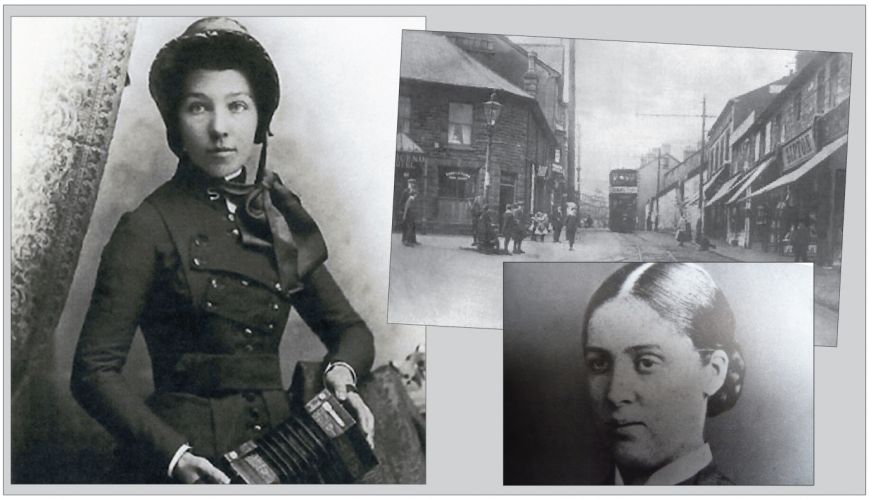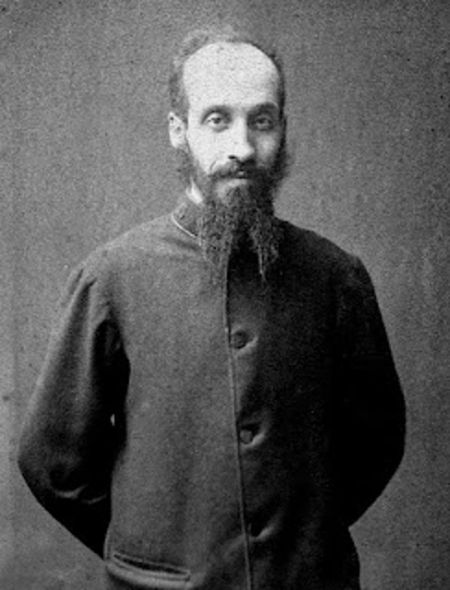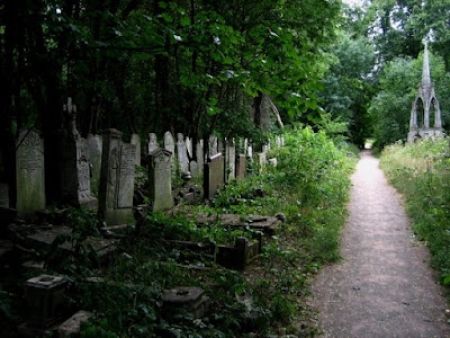Louisa Lock - a martyr for the cause in a Welsh mining town

Louisa Lock - a martyr for the cause in a Welsh mining town
Louisa Lock was one of many ‘Hallelujah Lasses’ (like the young Salvationist above left) who were fearless in their preaching of the gospel. Kate Shepherd (below right) was one of these ‘lasses’ who sparked a revival in the Rhondda Valley of Wales. (Above right) The town square of Pentre, where Kate and Louisa would preach the gospel and hold prayer meetings.
As William Booth’s Christian Mission evolved into The Salvation Army, much of the evangelistic work was being done by women, often better known as ‘Hallelujah Lasses’.
This was no more evident than in the grimy coalfields of South Wales, where two young ‘lasses’ – Kate Shepherd and Louisa Lock – fearlessly preached the gospel resulting in thousands of conversions.
Kate was the first to make an impact for Christ, sparking a revival over a few months in 1879 in the Rhondda Valley town of Pentre, where it was reported that 2500 came to Christ under her preaching.
Despite her success, Kate was reappointed elsewhere in Britain, but her successor picked up where she left off. The incoming officer was Louisa Lock, a ‘seasoned campaigner’ despite being only 18 years of age.
Louisa had joined The Christian Mission at 14, became an officer at 16, and over the next four years, packed a lifetime’s worth of evangelistic work into her short time on earth before being promoted to glory at the age of 20 from tuberculosis.
Louisa was born in Shoreditch, London, on 16 December 1860 into a relatively poor family, the 14th of 17 children. Without any influence from her family, she began attending Sunday school, was saved at 14 and became an enthusiastic worker with The Christian Mission in 1874.
She travelled all over England preaching the gospel and, at 16, was appointed to the rank of captain. She always gave the work of ministry her all, often pushing herself beyond the level of her strength. While she was still in the north-east of England, her health began to fail. She was then sent by the newly named Salvation Army to the Rhondda Valley to take over the work begun earlier that year by Kate in the mining town of Pentre. She held nothing back, even being imprisoned for praying on the streets.
Fourteen people were saved in the very first meeting she led in the town, and in almost every meeting, people were surrendering to Christ.
 George Railton Scott admired Louisa Lock’s dedication to spreading the gospel in trying circumstances.
George Railton Scott admired Louisa Lock’s dedication to spreading the gospel in trying circumstances.
A leading Salvationist at the time, George Scott Railton, paid a visit to the mission. Louisa was ill in bed at the time, but she forced herself to get up to go and speak at the evening meeting. Her colleagues tried to dissuade her, seeing how unwell she was, but she persisted. She eventually collapsed and remained unconscious for several hours. This sort of thing happened on several occasions in the weeks that followed.
Here is George Scott Railton’s account of Louisa’s ministry, including the time when she was imprisoned:
“No less glorious was the career of Captain Louisa Lock ... it was at Pentre in South Wales that she was to suffer for Christ the most, and win her most distinguished victory. She was already in a very exhausted condition, sometimes remaining in unconsciousness for hours together after conducting services, when all at once an attempt was made to silence her voice, in the open air at any rate, altogether. While kneeling in a large space opposite a public house at prayer, at ten minutes past six on Sunday evening, a police officer came over from the house, and took her name with those of several others ... Captain Lock and her Soldiers, refusing to pay the fine, or have it paid for them, were sent to Cardiff jail for two days’ hard labour. Thousands saw them depart. Prayer and other meetings of a sympathetic kind were held in every place of worship in the valley on the Sunday, and it was estimated that not less than 20,000 persons turned out at various points along the line to witness their return.”
By the time Louisa Lock had completed her time in the Rhondda, following in the footsteps of her predecessor Kate Shepherd, the two of them had set much of the Rhondda ablaze with revival fire. It was known what was happening far and wide. In her autobiography, the evangelist Rosina Davies wrote:
“All over the mining areas the public houses were empty ... and there was less swearing in the mines and on the streets. The horses were better treated underground. During the dinner hour men and boys gathered together and held prayer meetings to the joy of the older Christian miners.”
Even The Telegraph newspaper in London commented:
“... the revival now going on in the Rhondda Valley by The Salvation Army has given so great a stimulus to every religious denomination.”
 Bow Cemetery in London, where Louisa Lock is buried.
Bow Cemetery in London, where Louisa Lock is buried.
Louisa went on to serve in Leeds and Gateshead after leaving Pentre in 1880. She married Captain George Howe in Hackney in the autumn of 1880, but she was already ill with tuberculosis by this time.
The newly married couple were initially sent to work in Newport in South Wales, but the open-air work there in the winter did not help Louisa. She rapidly went downhill, probably greatly weakened by several years of intense effort preaching the gospel in the open air. After a brief spell in Hucknell, the Howes were called to London, where Louisa could get medical help, but she continued to decline. She died on 28 February 1881 at the age of just 20.
Louisa was buried in Bow Cemetery following a funeral service conducted by Bramwell Booth in which he spoke the following words:
“This sister ceased not, day nor night, to warn sinners with whom she came into contact, to flee from the wrath to come! She went forth in weakness and pain of body into the streets to proclaim Jesus, that she might pluck men and women as brands from the burning. What are we going to do? Are we going to follow on? To think nothing of earthly things, earthly sorrows and sufferings but having our conversation in heaven, keeping our eye upon the mark for the prize of our high calling.”
* Information sourced from the article ‘Teenage Revivalists in the Rhondda’ that appeared in the Welsh ‘welldigger’ online blog (daibach-welldigger.blogspot.com) in 2016.
Comments
No comments yet - be the first.